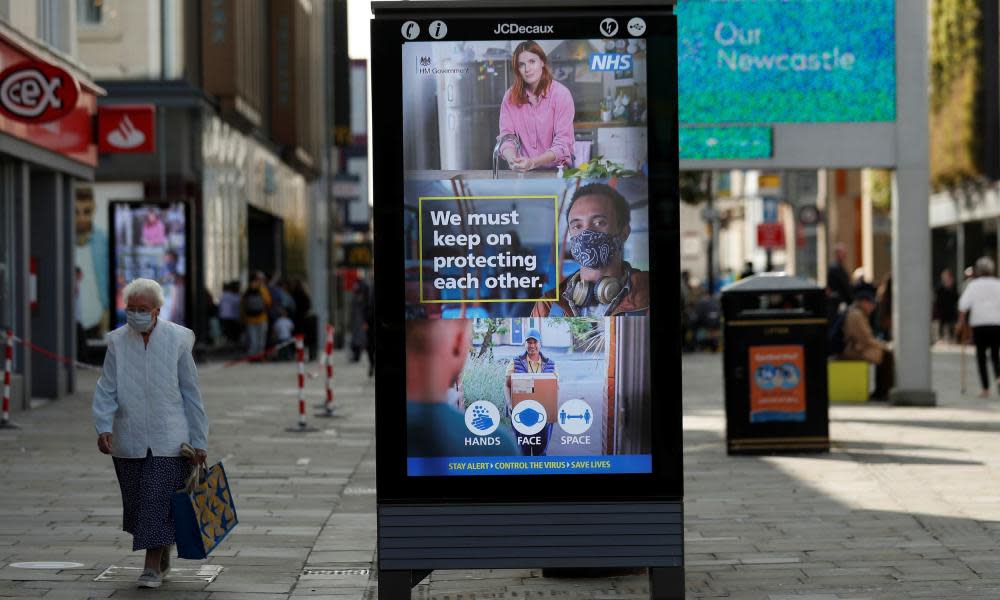Covid-19 restrictions announced for swathe of north-east England

Nearly 2 million people in north-east England will be banned from mixing with other families under the strictest measures imposed since the country eased out of nationwide lockdown.
The restrictions, which will come into force at midnight on Thursday, will prohibit residents in seven council areas from meeting others outside their support bubbles and include a 10pm curfew on nightlife.
The rules will apply to people in Newcastle, Northumberland, North Tyneside, South Tyneside, Gateshead, County Durham and Sunderland.
The health secretary, Matt Hancock, announced the measures on Thursday following a sharp rise in coronavirus cases in the north-east and amid growing concern about a UK-wide rise in cases.
The number of confirmed Covid-19 cases in the UK rose to 3,991 on Wednesday, up from 2,434 10 days earlier. Hancock said the number of hospital patients requiring mechanical ventilation was above 100 for the first time since July.
A Guardian analysis shows the number of infections has tripled in the seven affected areas in the past three weeks, far outstripping the rest of the UK. The region of nearly 2 million people accounted for 15% of England’s coronavirus cases in the week to 14 September, despite making up only 3% of the population.
Hancock told MPs the infection rate in Sunderland was 103 cases per 100,000 people, nearly four times the England average, and was above 70 in South Tyneside, Gateshead and Newcastle.
“I know, and the whole house knows, that these decisions have a real impact on families, on businesses and communities. I can tell everyone affected that we do not take these decisions lightly,” he said. “We agree with the local councils that we must follow the data and act, and the data says that we must act now so we can control the virus and keep people safe. I know that the people of the north-east will come together to defeat this virus as defeat it we must.”
While similarly strict measures have been introduced elsewhere in the UK, including parts of Greater Manchester, West Yorkshire and the West Midlands, it is the first time a 10pm curfew has been imposed on public venues in such a large area. The restrictions include a ban on socialising with anyone outside of a household, whether in a private home or garden, a public space such as a park, or in a venue such as a pub or restaurant.
Hospitality for food and drink should be restricted to table service only, Hancock said, and leisure and entertainment venues, including pubs, bars and restaurants, must close between 10pm and 5am. Single-adult households that have a support bubble will still be able to meet that family, but all other social mixing is prohibited.
The move reflects growing concern in Whitehall at rising infections in the north-east, where South Tyneside, Gateshead and Sunderland all have infection rates almost three times the average for England. However, Labour MPs representing north-east England seats called for further information from Hancock on the measures.
They requested “urgent clarification on a number of key issues” around interventions being planned in Sunderland, South Tyneside, Gateshead, Newcastle-upon-Tyne, North Tyneside, Northumberland and County Durham.
The letter, signed by 15 Labour MPs, asked whether household-level information and contact-tracing data would be available to local authorities and what extra testing capacity there would be in the region.
“We agree that restrictions must be put in place in order to protect public health, and prevent the further spread of Covid-19, and we support measures taken in order to save lives,” the MPs said. “We do, however, believe that this must be done in close collaboration with local authorities, who must have access to all appropriate information, data and support in order to make the best decisions for their areas.”
The letter was sent by the Sunderland Central MP, Julie Elliott, and signed by colleagues including the shadow chief secretary to the Treasury, Bridget Phillipson, and the shadow science minister Chi Onwurah.

 Yahoo News
Yahoo News 
